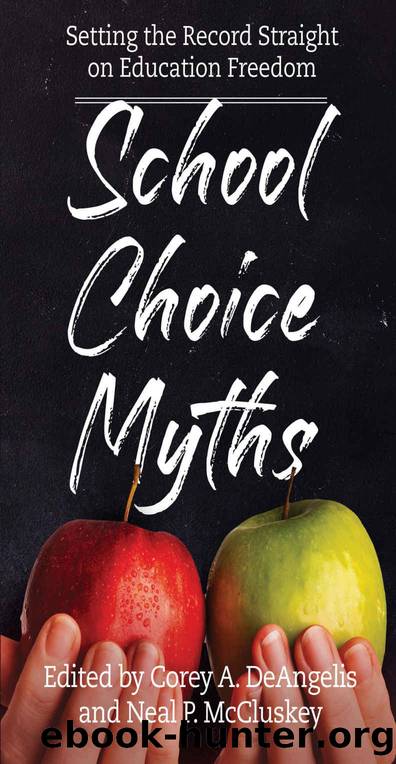School Choice Myths by Corey A. DeAngelis & Neal P. McCluskey

Author:Corey A. DeAngelis & Neal P. McCluskey [DeAngelis, Corey A. & McCluskey, Neal P.]
Language: eng
Format: epub
Publisher: Cato Institute
Published: 2020-10-07T06:00:00+00:00
Case Studies: Florida and Louisiana
To investigate the effectiveness of the equalitarian policies, it is useful to consider the experiences of two states with school choice programs for low-income students that have very different regulatory regimes: Louisiana and Florida.
Louisianaâs voucher program has all of the equalitariansâ recommended regulations: an open-admissions requirement, price controls, accreditation, and a mandate to administer the state test with consequences tied to performance. By contrast, Floridaâs tax-credit scholarship program eschews all these regulations, though it does require schools to administer their choice of a number of nationally norm-referenced tests and publicize the results. Holding all else equal, if equalitarians are correct, low-income students in Louisiana should have greater access to higher-quality private schools than low-income students in Florida.
Of course, not all else is equal. States differ significantly in their demographics and countless other observable and unobservable factors. Without use of randomized controlled trials, it is difficult to demonstrate conclusively that any given stateâs policies outperform another stateâs. But it is unfeasible, legally and constitutionally, to randomly assign one policy to some states and another policy to others.
Still, if a stateâs school choice program were to achieve widespread access for low-income families to higher-quality schools than their assigned district schools without equalitarian regulations, it would demonstrate that those regulations are not necessary to achieve equalitarian ends. Likewise, if a school choice program with equalitarian regulations provided only limited access to a market in education, and high-quality research found persistently poor results relative to the district school system, then it would demonstrate that those regulations are not sufficient to achieve equalitarian ends. That is, in fact, what the respective experiences of Florida and Louisiana show.
The Florida Tax-Credit Scholarship Program
In 2001, Florida became the third state to enact a tax-credit scholarship program. Under the program, corporate donors receive dollar-for-dollar credits for contributions to approved scholarship funding organizations (SFOs).6 The SFOs provide scholarships to students from low-income families to attend private schools. During the 2017â2018 academic year, 107,095 Florida students received scholarships worth an average of $6,011 to attend 1,801 private schools.7 Thatâs about 4 percent of the 2.9 million students attending Florida public schools, which spend about $10,000 per pupil annually, on average.8
The program does not mandate open-enrollment policies, impose price controls, or require that private schools be accredited to receive scholarship students. The program does mandate that schools administer a standardized test to scholarship students in grades 3â10, but it does not mandate a single test.9 Instead, schools may choose from among a list of nationally norm-referenced tests.
The scholarships aid some of the most disadvantaged children in the state in terms of income and racial or ethnic background, and as measured by test scores. To be eligible, families can earn up to 260 percent of the federal poverty line ($65,260 annually for a family of four in 2018â2019), with priority given to families earning less than 185 percent of the poverty line ($46,435 for a family of four in 2018â2019).10 Families earning up to 200 percent of the poverty
Download
This site does not store any files on its server. We only index and link to content provided by other sites. Please contact the content providers to delete copyright contents if any and email us, we'll remove relevant links or contents immediately.
The Art of Coaching Workbook by Elena Aguilar(51137)
Trainspotting by Irvine Welsh(21608)
Twilight of the Idols With the Antichrist and Ecce Homo by Friedrich Nietzsche(18602)
Fangirl by Rainbow Rowell(9213)
Periodization Training for Sports by Tudor Bompa(8237)
Change Your Questions, Change Your Life by Marilee Adams(7718)
This Is How You Lose Her by Junot Diaz(6857)
Asking the Right Questions: A Guide to Critical Thinking by M. Neil Browne & Stuart M. Keeley(5741)
Grit by Angela Duckworth(5577)
Red Sparrow by Jason Matthews(5450)
Paper Towns by Green John(5163)
Room 212 by Kate Stewart(5091)
Ken Follett - World without end by Ken Follett(4705)
Housekeeping by Marilynne Robinson(4420)
The Sports Rules Book by Human Kinetics(4367)
Double Down (Diary of a Wimpy Kid Book 11) by Jeff Kinney(4252)
Papillon (English) by Henri Charrière(4238)
The Motorcycle Diaries by Ernesto Che Guevara(4069)
Exercise Technique Manual for Resistance Training by National Strength & Conditioning Association(4048)
